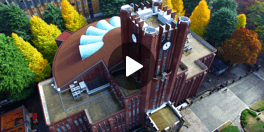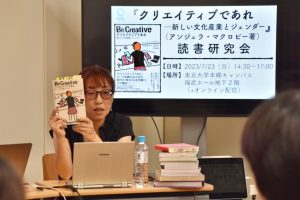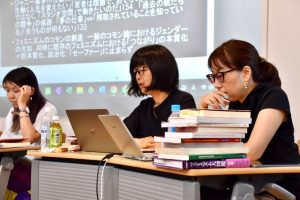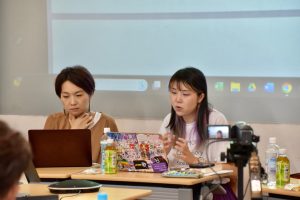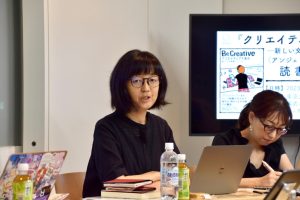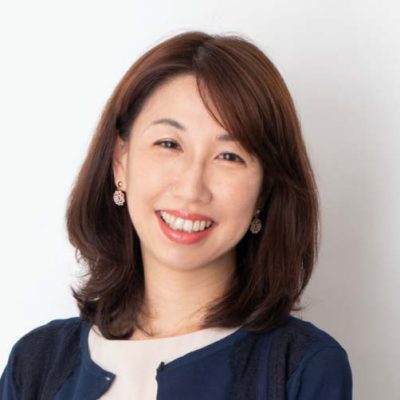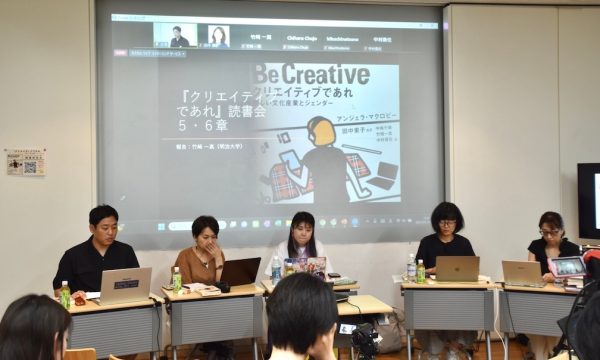
August 24, 2023
レポート:『クリエイティブであれ―新しい文化産業とジェンダー』読書研究会ークリエイティブ産業と労働を考えるReport: Workshop on “Be Creative: Making a Living in the New Culture Industries”: Thinking about Creative Industries and Labour
2023年7月23日(日)、2月に刊行されたアンジェラ・マクロビー氏の『クリエイティブであれー新しい文化産業とジェンダー』の読書研究会が福武ホールにて開催されました。本研究会は田中東子研究室とカルチュラル・スタディーズ学会共催で、司会の田中(本書監訳者)のほか、翻訳者三名(中條千晴(東京外国語大学)、竹崎一真(明治大学)、中村香住(慶応義塾大学))と討論者として招待された菊地夏野氏(名古屋市立大学)が登壇しました。事前の申し込みは250名程度となり、当日は現地で20名、オンラインでも100名以上の方が参加しました。
研究会の始まりに、まず翻訳者三名が本書各章(第1・2章/中村、第3・4章/中條、第5・6章/竹崎)の内容を要約しながら、その議論の背景と意義を説明しました。第1・2章では、イギリスで新たに拡⼤したミドルクラス層が求めている、マルチスキルを駆使し、多場面でクリエイティブな仕事を遂げて報酬をもらう仕事生活を分析しました。固定した職場は皆無であるゆえに福祉が欠如し、リスクが高まり生活が不安定になる一方、個人が「やりがいがある」というロマンスに補償される構造になっています。この構造が第3〜6章に議論されるアート業界や女性の情動労働、ベルリンのファッション産業にそれぞれ現れましたが、発表者が文脈を紹介しつつ、その現実を生産する「装置」がどのように構成されているのかを説明しました。
三名の報告後、菊地氏が一貫した関心からとても刺激的な論点を提供しました。職場において、女性にはホモソーシャルな「上昇ルート」がないからこそ個人的な「上昇志向」を抱えこまなければならないこと、そしてこの上昇志向が、女性たちを縛り付ける構造からの「逃走線」でありながら「捕獲」(本書101頁)の場でもあることを強調しました。発表者がそれぞれの研究に基づく事象を引用しながら応答した後、会場参加者からも、例えば、春からテレビ業界で働くようになり気づいたという働きづらさやそれを告発することが難しい、といった点についてコメントがありました。会場は熱気に包まれ、最後まで議論が盛り上がりました。
記事:劉カイウェン(博士課程)
写真:山本恭輔(博士課程)
A research workshop on the book Kurieitibu de Are: Atarashii Bunka Sangyo to Jenda (Kadensha, 2023), the Japanese translation of Angela McRobbie’s Be Creative: Making a Living in the New Culture Industries (2016) was held at Fukutake Hall on July 23rd, 2023. The workshop was co-organized by Toko Tanaka Laboratory and the Association for Cultural Typhoon. Three translators, Chiharu Chujo (Tokyo University of Foreign Studies), Kasumi Nakamura (Keio University), and Kazuma Takezaki (Meiji University) presented at the workshop. The translation supervisor Professor Toko Tanaka acted as coordinator, and Professor Natsuno Kikuchi (Nagoya City University) was invited as commentator. Around 250 people applied for the event with 20 joining on the spot and more than 100 joining online.
Three presenters first summarized the discussions in each chapter (Nakamura: Chapters 1&2, Chujo: Chapters 3&4, Takezaki: Chapters 5&6) and introduced the background and intellectual and political significance. The first two chapters analyzed the work style pursued by the newly expanded urban middle class in the UK, in which they receive rewards for multi-skilled, multi-faceted, creative work efforts. Although the lack of a fixed workplace results in decreased access to welfare and increased exposure to risk and precarity, this is compensated by “the romance of being creative.” The same structure further unfolds in the art industry, women’s emotional labor, and Berlin’s fashion scene, discussed in Chapters 3-6. The presenters contextualized the cases and explained how the dispositif continuously reproducing these realities is constituted.
After the presentations, Professor Kikuchi provided stimulating ideas based on her long-established academic interest. She emphasized the fact that in the workplace, women are forced to embrace their own individual “upward mobility” because there is no homosocial “upward route” for them, and that this upward mobility is both a “line of flight” from the restrictive structures and a place of “capture” (101) by neoliberal capitalism as well. After the presenters had responded, referring to their own fieldwork experience, members of the audience raised further important questions. For example, one person, who had started working in the television industry this year, raised the issue of difficulties in the workplace and the obstacles to reporting these difficulties. Lively discussions lasted until the very end.
Text: Kaiwen Liu (PhD student)
Photo: Kyosuke Yamamoto (PhD student)
English proofreading: David Buist(Project Senior Specialist)
主担当教員Associated Faculty Members
教授
田中 東子
- 文化・人間情報学コース
- 情報学環教育部
Professor
TANAKA, Toko
- Cultural and human information studies course
- Undergraduate research student program

